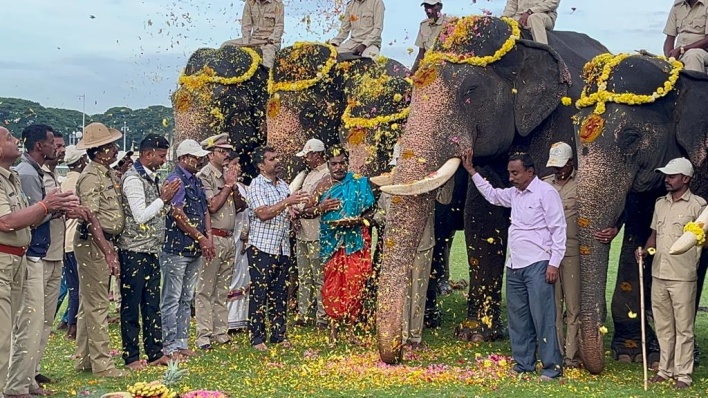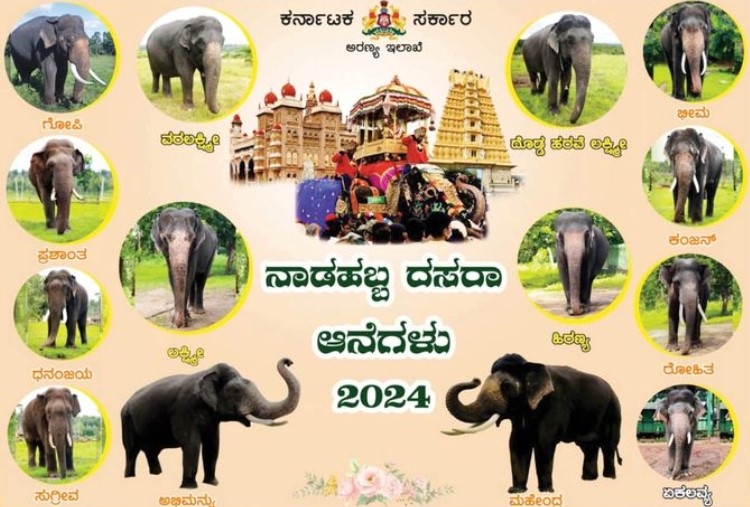Mysore Dasara’s preparations commence in August every year with the ceremonial journey of the elephants to Mysore. The journey of the elephants to Mysore for the Dasara celebrations is called Gajapayana. On Vijayadashami, Jamboo Savari takes place on the streets of Mysore with the trained elephants of Mysore Dasara.
Gajapayana, the journey of the elephants of Mysore Dasara to Mysore
The tradition of the elephants of Mysore Dasara journeying to the royal city began in 1610 AD in Srirangapatna. From then on, the practice has become an integral part of the Mysore Dasara celebrations.

The elephants are often captured via the Khedda method. They are judged in an open area if they suit the Mysore Dasara events. Furthermore, they are inspected on the basis of their gait, personality, strength, vulnerability to seduction, and character. The king himself would watch over the training. The captured elephants’ habitats are usually the training camps and national parks where they are trained. The mahouts and Kavadis (assistants of the mahouts) hail from around the Sakrebailu and Dubare forest areas. They communicate with the elephants in a language that is a mix of Urdu, Persian, and Kannada.
The Dasara elephants proceed from the Nagarhole National Park base to Mysore in batches in trucks. They sometimes walked the 70 km or for a short distance. They are received formally by the District Minister and others at the Veerana Hosahalli forest checkpost of Nagarhole National Park. People come forward to greet the elephants along the way. The elephants arrive a few months before the Dasara celebrations to Mysore to get trained for the Jumboo Savarai. They are accompanied by their respective Mahouts and Kavadis. The people welcome them with great warmth and cheer as per the tradition of the Mysore kings.
Food of the elephants of Mysore Dasara
Ragi Mudde, forms the diet of the elephants of Mysore Dasara in their camps. It is a mixture of Ragi, horse gram and some fodder. However, on reaching Mysore, they get to eat a variety of food. They are fed with Uddina bele (black gram), wheat, boiled rice, onions, vegetables and green gram. After the rehearsal, they eat coconut, jaggery, sugarcane, groundnut, and rice with a bit of salt to taste. The mahouts also serve them with banyan leaves. The elephants’ food is protein-rich and has high calories for maximum fitness.
Mysore Dasara elephants names 2024
14 elephants are participating in the Jamboo Savari of Mysore Dasara 2024. The Minister for ‘Forest, Ecology and Environment’ Eshwar Khandre released a poster with the info on the Mysore Dasara elephants 2024. This poster was released during the International Conference on ‘Human Elephant Conflict Management – 2024’. The programme was held as part of World Elephant Day celebrations at the University of Agricultural Sciences, GKVK campus in Bengaluru.

| Name of the elephant | Gender | Age | Name of the elephant camp |
|---|---|---|---|
| Abhimanyu | Male | 58 | Mathigodu |
| Bheema | Male | 24 | Mathigodu |
| Ekalavya | Male | 39 | Mathigodu |
| Mahendra | Male | 41 | Mathigodu |
| Dhananjaya | Male | 44 | Dubare |
| Sugreeva | Male | 42 | Dubare |
| Gopi | Male | 42 | Dubare |
| Kanjan | Male | 25 | Dubare |
| Prashanth | Male | 51 | Dubare |
| Rohit | Male | 22 | Ramapura |
| Lakshmi | Female | 23 | Ramapura |
| Hiranya | Male | 47 | Ramapura |
| Dodda Harave Lakshmi | Female | 53 | Doddaharave |
| Varalakshmi | Female | 68 | Bheemanakatte |
Harsha, Aiyappa, Parthasarathy, and Maladevi are in reserve in their respective camps. They will arrive in Mysore if any replacement intended.
Mysore Dasara Elephant Abhimanyu
Mysore Dasara elephant Abhimanyu will perform as the lead elephant in the Jamboo Savari, Mysore Dasara 2024. For the fifth time, Abhimanyu will carry the howdah with the idol of Goddess Chamundeshwari during the Jamboo Savari.
In conclusion, the elephants of Mysore Dasara during the Jamboo Savari are surely a wonderful sight to behold.